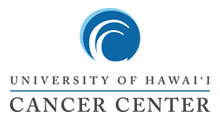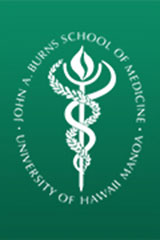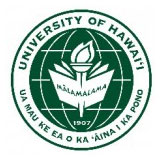Life Sciences at the University of Hawaii
 The University of Hawaii Cancer Center is one of only 68 research organizations in the United States designated by the National Cancer Institute. This affiliation requires stringent and constant evaluation, yet brings the distinction of being recognized among the best cancer research institutions in the world.
The University of Hawaii Cancer Center is one of only 68 research organizations in the United States designated by the National Cancer Institute. This affiliation requires stringent and constant evaluation, yet brings the distinction of being recognized among the best cancer research institutions in the world.
Our scientists and physicians focus on key cancers that impact us in Hawaii. Yet just as importantly, our work contributes to a global body of knowledge that leads to the development of new life-saving treatments and therapies. And we engage in scientific collaborations on an international scale, from clinical trials conducted across the U.S. to partnership programs in Guam, Micronesia and the Pacific.
The UH Cancer Center together with its clinical partners, The Queen’s Medical Center, Hawaii Pacific Health, Kuakini Medical Center and UH Manoa’s John A. Burns School of Medicine form the UH Cancer Consortium, an alliance of the state’s leading healthcare organizations united in our common goal of eliminating cancer through science.
For more information on the University of Hawaii’s Cancer Center go to: http://www.uhcancercenter.org/
The John A. Burns School of Medicine (JABSOM) at the University of Hawai‘i at Mānoa is one of the leading medical education institutions in the United States. The school houses the largest biomedical research facility in Hawai‘i. The school’s basic mission is not only to train high-quality physicians, but also to train biomedical scientists and allied health workers.
 For the last three years, JABSOM has ranked #1 in National Institutes of Health research awards among community-based public medical schools (i.e., public medical schools without a university hospital) and ranked #1 in the nation by the Association of American Medical Colleges in retention of combined MD and Resident alumni practicing in-state. The University of Hawai‘i at Mānoa is one of the most ethnically diverse institutions of higher education in the nation and is one of only 13 institutions in the US to hold the distinction of being a land-, sea-, and space-grant research institution.
For the last three years, JABSOM has ranked #1 in National Institutes of Health research awards among community-based public medical schools (i.e., public medical schools without a university hospital) and ranked #1 in the nation by the Association of American Medical Colleges in retention of combined MD and Resident alumni practicing in-state. The University of Hawai‘i at Mānoa is one of the most ethnically diverse institutions of higher education in the nation and is one of only 13 institutions in the US to hold the distinction of being a land-, sea-, and space-grant research institution.
For more information on The John A. Burns School of Medicine (JABSOM) go to: http://jabsom.hawaii.edu/
 The University of Hawaii’s Cell and Molecular Biology Graduate Program in biomedical sciences provides an integrated course of study for students seeking a PhD or MS degree in health-related research that emphasizes the increasingly powerful techniques and approaches of cell and molecular biology. Areas of particular strength include cancer biology, neurobiology, marine biology, molecular and population genetics, immunology, virology, and molecular medicine. Participating faculty members are drawn from across the campus: they come from the basic and clinical sciences departments of the Medical School, The Cancer Research Center, The Pacific Biosciences Research Center, The College of Natural Sciences, and The College of Tropical Agriculture.
The University of Hawaii’s Cell and Molecular Biology Graduate Program in biomedical sciences provides an integrated course of study for students seeking a PhD or MS degree in health-related research that emphasizes the increasingly powerful techniques and approaches of cell and molecular biology. Areas of particular strength include cancer biology, neurobiology, marine biology, molecular and population genetics, immunology, virology, and molecular medicine. Participating faculty members are drawn from across the campus: they come from the basic and clinical sciences departments of the Medical School, The Cancer Research Center, The Pacific Biosciences Research Center, The College of Natural Sciences, and The College of Tropical Agriculture.
The Cell and Molecular Biology Graduate Program faculty have ongoing research programs in areas such a genetics, cell biology, biochemistry, and neurobiology. The program also provides instruction in the basic principles and concepts of genetics, biochemistry, and molecular biology to medical students, graduate students from various disciplines, and undergraduates. The faculty also participate in the training of PhD and MS graduate students in the interdisciplinary Cell and Molecular Biology Graduate Program. This program brings together faculty with expertise in biochemistry, cell biology, cell signaling, developmental biology, genetics, immunology/retrovirology, neurobiology/neurophysiology, and reproductive function for collaborative teaching and research activities.
For more information on the University of Hawaii’s Cell and Molecular Biology Graduate Program in biomedical sciences go to: http://cmbgrad.jabsom.hawaii.edu/.
Continue here to learn more about Hawaii Life Sciences Companies.
